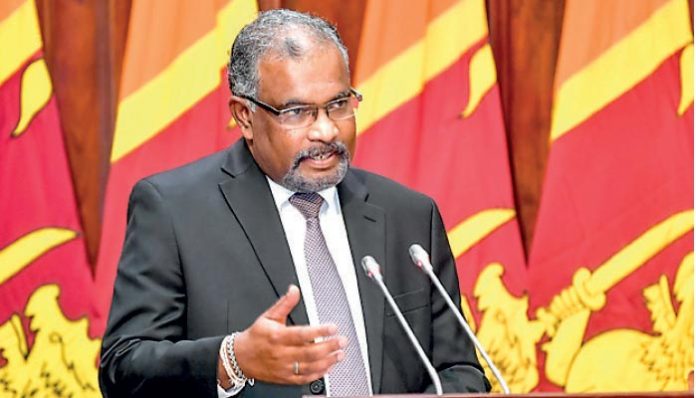Outgoing Treasury Secretary Mahinda Siriwardana bid farewell to public service after more than three decades, delivering a speech that was both candid and reflective yesterday (18). Siriwardena, who played a pivotal role in steering Sri Lanka through its worst post-independence economic crisis, used the occasion to recount the immense challenges he faced.
Full speech:
It is with a mixture of deep emotion—gratitude, humility, and reflection—that I speak to you today, at this farewell held to mark my retirement as Secretary to the Treasury of the Ministry of Finance.
Let me first express my heartfelt thanks to the President, who endorsed this idea and took a personal interest in ensuring this farewell was held. I also thank the two State Ministers of Finance for their guidance, and all officials who worked hard to organise this event.
To be honest, I never expected a farewell like this. When I heard about it, I felt both surprised and happy. I’ve always preferred to work silently, and leave silently.
Today marks three years, two months, and ten days since I assumed office on 8 April 2022. I remember that day vividly. The country was on the brink of collapse. The Treasury had no money. Foreign reserves were depleted. There was a shortage of essential goods.
The people were protesting—those voices and cries still echo in my ears. It was a time when citizens had taken to the streets, and their frustrations were legitimate. The Central Bank Governor and I worked hand in hand to support the government’s recovery effort to the best of our ability.
From discussions with the IMF, to implementing the programme, to restructuring our debt—we were fully committed. In the early stages, we had to act with urgency. We didn’t even know how to cover daily expenses. I still remember how we asked: how do we pay for the morning? What about the afternoon? That was our reality.
We didn’t have rupees. We didn’t have dollars. The only rupees we had—Rs 2,700 billion—were borrowed from the Central Bank. We had hit a wall. Despite the enormous pressure, we kept working, even through exhaustion and mental strain.
By June 2023, the stress affected my health. Yet, I never abandoned my duties. I was determined to create a space where Treasury officials could work independently, without interference. I believed then—and I believe now—that young officials must be empowered, trusted, and protected from undue influence. I always told them: “Do your job freely. Come to me with your ideas, and I will support you.”
I rarely wrote instructions down. That’s not how I work. I encouraged open discussion and made myself accessible, so that we could resolve problems together—even amidst difficult and complex situations.
And we did. The President, Finance Minister, State Ministers, Cabinet, and Parliament all worked tirelessly. In the Treasury, we offered advice; the final decisions always belonged to the government. Our duty was to advise professionally, without bias.
Let me also say this—and this is something I’ve said before, over and over again: I knew this economic collapse was coming long before April 2022. In fact, two years earlier, I had already seen it coming. I tried to warn people. I spoke out. But no one listened. Neither the Monetary Board, nor the then-Governor of the Central Bank took my concerns seriously. I’m not afraid to say this now.
At home, I told my wife often, “We’re heading toward collapse.” Even though I wasn’t in charge at that time, I knew what was coming. But there was nothing I could do. The warnings went unheeded. That silence and disregard contributed directly to the disaster that unfolded.
I may well be the only senior official who was continuously involved in this process from 2020 until now—witnessing the crisis unfold, trying to avert it, then managing its aftermath.
Despite it all, we managed to bring stability. The economy is no longer spiralling. Schools are open. Tourists are returning. Businesses are slowly recovering. But this is not a time for complacency. We must go further. We must strengthen social safety nets, protect our most vulnerable, and invest in health, education, skills, and technology. There is still so much work to do.
I believe Sri Lanka needs a strong, future-ready Treasury—one filled with capable, ethical professionals who can rise above politics and serve the nation. Buildings alone don’t run a government; it’s the people within them that matter.
It’s our duty to create officers who are not only subject-matter experts, but who understand the full picture—how debt, spending, banking, and the global economy are all interconnected.
And I have always believed that we should not use our positions to glorify ourselves. Rather, our service should uplift the institution, and the public. That is why I always reminded officials that we are public servants, paid by the people. Our loyalty must always lie with them.
To all officials who worked alongside me at the Ministry of Finance, the Central Bank, the President’s Office, and beyond—I offer my heartfelt thanks. I’m also deeply grateful to the private sector, state corporations, international institutions, and especially to my own team at the Treasury.
To my wife Jayantha, my constant support through this demanding journey—thank you. To my children, Himesh and Sahan, and to my entire family—thank you for standing by me.
I remember my parents today with love and reverence. They instilled in me a thirst for knowledge and a commitment to service. I owe them everything.
Serving Sri Lanka has been the greatest honour of my 34-year career. I may be retiring, but my commitment to the country and its people is not over. If ever my expertise is needed again, I will not hesitate to serve.
Finally, I pray that Sri Lanka rises stronger. May we harness our resources wisely, and may the President, the government, and the people of this country be blessed with strength and courage to lead us forward.
Thank you.






